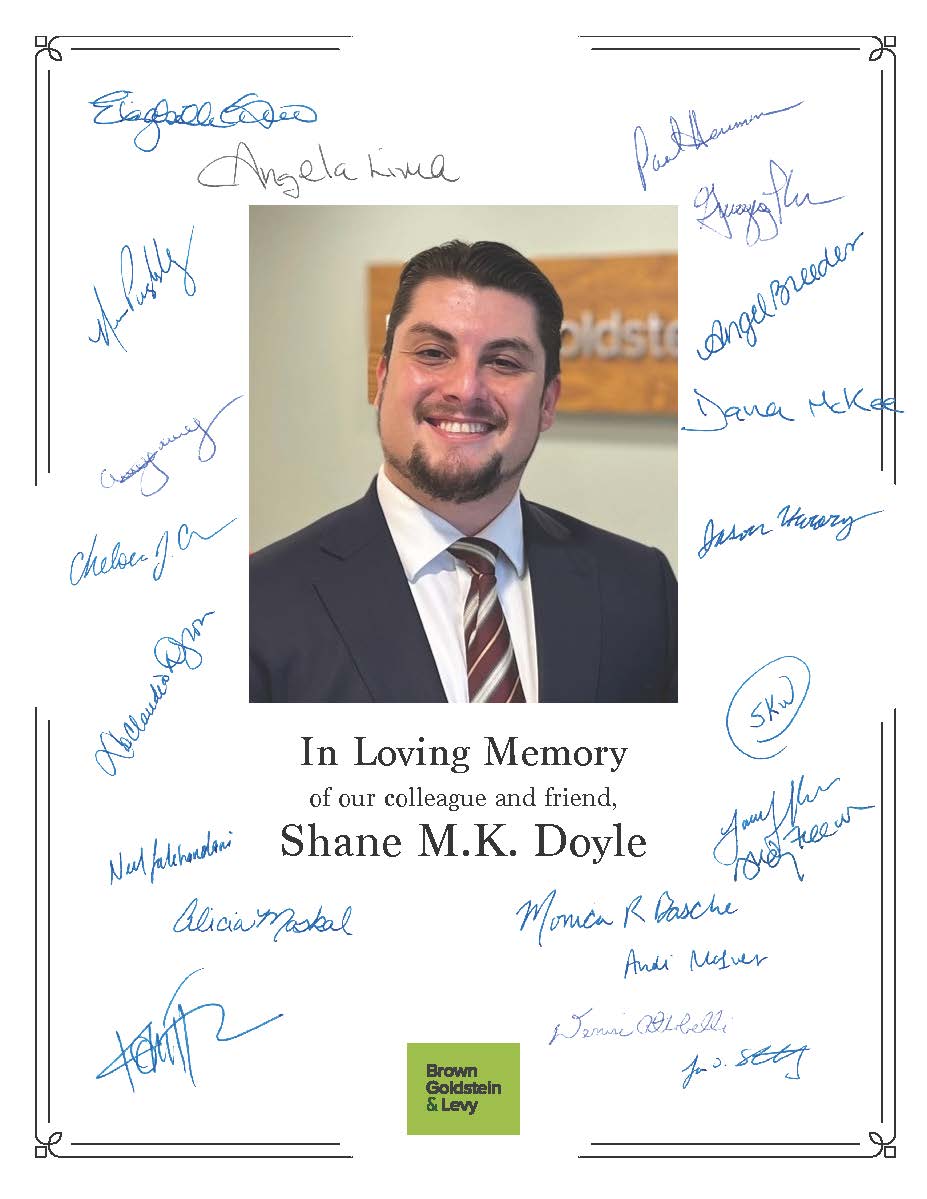
Brown, Goldstein & Levy mourns the loss of our colleague and dear friend, Shane Doyle. Over the past month we shared stories and memories of Shane, beginning with when he first joined the firm as a paralegal in 2019. Shane initially interviewed for a summer associate position, but was ultimately recruited as a full-time paralegal, a “coup” for BGL. In his cover letter for that job, Shane wrote, “I always knew I wanted to use my education to help others. This is because I believe that those who are able to climb the socioeconomic ladder should pay it forward to those who face even greater obstacles.”
This was true of Shane’s path to practicing law and it was true of the commitment he brought to the work he wanted to do as a lawyer, which was then, and continued to be throughout his career: to help people.
Everyone’s first time meeting Shane is something they remember fondly. He had a “firm handshake and warm smile.” And from his first interview it was clear how committed he was to the type of work BGL does and how hard he had worked to make his way to law school—a second career for him. He talked a “mile a minute” about the law, his ten years working at Montgomery College while also attending school, and most memorably about his love for his Mom and the singular influence she had on the man he was, particularly on his drive and work ethic.
Shane’s pride in his work was reflected in the excellent quality he produced. He took to legal work “like a fish to water,” and “in no time at all, he became an essential member of any team he joined.” As one colleague put it, “everyone breathed a little easier if he was on the legal team.”
Working full-time as a paralegal while also an evening law student at the University of Maryland, Shane filled every spare moment at work, perpetually multitasking on his computer while talking into his headset, a look one colleague likened to “running mission control.”
Click to visit Shane Doyle’s full biography.
Shane’s precision never suffered even with so many competing demands on his time. His “cite-checking abilities were uncanny,” he cared about and understood the importance of the details in every case he worked on as a paralegal and later as an associate. He was known for going “above and beyond with his research” and for asking insightful questions to better understand the litigation strategy and position. Shane was always “hungry to learn more and go beyond what he was asked to research to get more of a big picture about a case.”
Shane was the legal team member who identified a critical miscalculation by defendants, buried in the mountain of spreadsheets they had produced, and the one who could recall every bit of testimony from a long transcript with ease and accuracy. He was known as the master of the record in all his cases, but also for being gentle with his colleagues when they misremembered something, always beginning his corrections with “I think what you might have meant was.”
Even as a law student Shane made case-winning contributions to the matters he worked on that made clients’ lives better. In one case, Shane developed a novel theory for why a client’s guilty plea for conduct, related to a longtime addiction the client had battled, should be reduced to probation before judgment—to allow the client to resume his life and work while continuing treatment. This was not a simple argument, it relied on a “complex statutory scheme” that “left room for doubt,” about whether such relief was available. And yet, in the first case of its kind, Shane’s argument prevailed. A colleague recalls that in the hallway after that hearing the client broke down in tears and thanked the team for helping get his life back on track.
Shane was also “an integral part” of the BGL team that filed an amicus brief in the Supreme Court of Maryland in Baltimore City Police Department v. Potts on behalf of a victims of police brutality. That brief argued that BPD was liable for its officers’ misconduct because of the department’s culture that enabled these types of constitutional violations by its officers. One of his BGL colleagues who worked on that brief with Shane recalled that even as a paralegal “Shane’s name should have been front and center” on its cover page because he handled a “vast majority” of the research and writing. As was typical of Shane, in re-working that brief he was able to call upon every helpful fact, and every nuance from the news coverage of the underlying incident. And, again, his arguments in that brief helped win the day—not just for the two victims named in the case, but for all others going forward.
Shane was particularly committed to the wrongful convictions work at BGL—work that he was hired back as an associate to specifically handle. As a paralegal Shane secured “life-changing benefits for a group of exonerees” under the Walter Lomax Act. After the Attorney General’s Office took the position that previously compensated exonerees were not eligible for the new, additional benefits available under that law, Shane, in just one day, found legislative history and crafted an argument explaining why the history of the Act supported construing the law’s benefits expansively for exonerees. His winning argument benefitted not just BGL’s client, but later clients and other exonerees who ultimately received these benefits as result of that success.